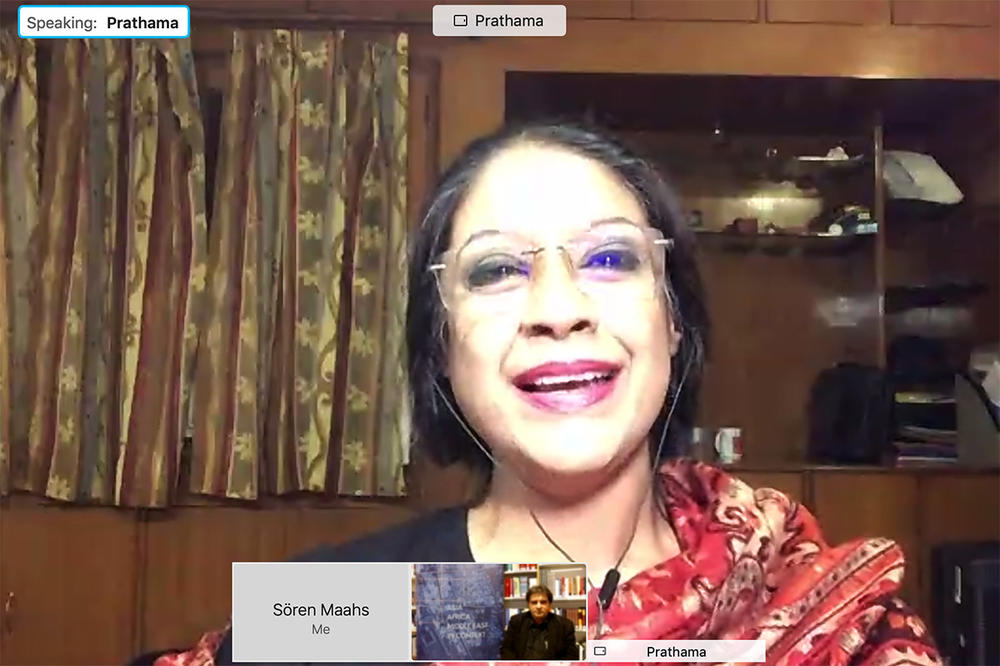Decolonizing Our Understanding of Time
News from Feb 26, 2021
In the second installment of the Berlin Southern Theory Lecture series, the Indian historian Prathama Banerjee explored south Asian concepts of time
A great number of scholars from the “Global South,” primarily from the humanities and social sciences, are working to counter and overcome the hegemony of Eurocentric theory. They do so, for example, by recognizing the significance of local historical figures, and refusing to reduce colonial history to the perspective of the colonizers.
The Berlin Southern Theory Lecture series, launched by the Institute of Social and Cultural Anthropology at Freie Universität Berlin and the Leibniz-Zentrum Moderner Orient (ZMO), aims to support this objective by showcasing different perspectives, distinct voices, and alternative interpretations of the world. The annual lecture, which brings thinkers from the Global South to Berlin, is intended to contribute to a global exchange of knowledge and ideas that deconstruct the universalist claims of Eurocentric worldviews.
The lecture took place last December online due to the coronavirus pandemic. Over 120 viewers from all over the world – from eastern and southern Africa, to south Asia, right through to North America – tuned in to watch the talk.
Post-colonial Approaches to the Humanities and Social Sciences
Prathama Banerjee, who joined from New Delhi via video call, is the second speaker to be invited to give the Berlin Southern Theory Lecture. Banerjee, a historian based at the Center for the Study of Developing Societies in New Delhi, has been working on developing a fundamentally new approach to the humanities and social sciences for several years. In an introduction to the talk, Professor Kai Kresse, co-organizer of the event, highlighted Banerjee’s focus on the rich intellectual traditions of south Asia in shaping a decolonized social theory.
An event spanning continents: Prathama Banerjee held the second Berlin Southern Theory Lecture via video conference from New Delhi.
Image Credit: Sören Maahs (screenshot)
The importance of reviving other intellectual traditions from this area of the world was also the subject of Prathama Banerjee’s lecture, “Time and the Limits of the Political: Anti-historical Excursions from South Asia.” A discussion on time – as a fundamental category of human experience, but also as a basic principle of historical thinking – formed the core of her argument.
Time as a Political Concept
Banerjee critiqued how time is typically classified according to the idea of linear progress in history. This widespread, universalizing tendency has led to the repression of non-European cultures of time, calendars, and chronologies, even causing them to vanish.
She also argued that time has been a political concept for quite some time now. It became a feature of political disputes much earlier, for example, during the nineteenth and twentieth centuries, when anti-colonial thinkers positioned traditional discourse concerning ideas of time against their rivals (political or otherwise).
Professor of religious studies at the University of Cape Town, Abdulkader Tayob, the current recipient of the Humboldt Foundation’s Georg Forster Research Award at the ZMO, kicked off a lively discussion following the lecture. Hansjörg Dilger, professor at the Institute of Social and Cultural Anthropology, moderated the conversation with participants from four continents who joined in. The discussion reflected a major interest in learning more about theoretical approaches and intellectual traditions from the Global South. It was clear that the participants are already eagerly anticipating the next installment of the Berlin Southern Theory Lecture.
The full version of this article originally appeared in German on February 4, 2021, in campus.leben, the online magazine of Freie Universität Berlin.
Sören Maahs
Further Information
You can watch Prathama Banerjee’s lecture here.

